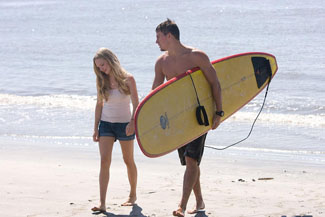Movie Review: Dear John
By Matthew Huntley
February 18, 2010
BoxOfficeProphets.com

Like many of its kind, Dear John is a cheesy, manipulative romance, which is exactly what it strives to be. It's not satirical or self-aware, but faithfully (and proudly) lives up to its genre. Just as we expect, boy (John) meets girl (Savannah); girl invites boy back to her place; boy asks girl out; boy and girl fall in love; boy leaves. The boy and girl vow to keep in touch the old-fashioned way - via handwritten letters. But their epistolary romance must bear the conflicts of the changing world, including the 9/11 terrorist attacks, unexpected deaths, and, of course, war (epic romances always need a war).
I can accept all this, and it gave me extra confidence knowing Lasse Hallstrom (What's Eating Gilbert Grape) was directing - he gives the movie a calm and serene pace - but what kept me at a distance from Dear John was the writing and lead actor. As any of the ads will tell you, the movie is based on the novel by Nicholas Sparks, who wrote The Notebook, a name he's been riding ever since it was adapted into a (better) feature film. I haven't read Dear John, but the screenplay by Jamie Linden doesn't make me too eager.
One of the problems is it paints the girl so pure and angelic that the character felt artificial, even for a story like this. Savannah is played by the striking Amanda Seyfried, whose eyes alone make her indelible. Seyfried is a good actress and I believe she played Savannah from the heart, but the character is written so perfect that it's almost nauseating. I get it: some 20-year-old girls choose not to smoke, drink, sleep around, etc. But to have Savannah also build houses and dream of opening a summer camp for autistic children seemed a bit much, or at least the movie made it seem like a bit much.
If Seyfried is good as Savannah, the same cannot be said of Channing Tatum as her romantic counterpart, John. I've seen Tatum in three films now, each of which he's played a man in the military, but he hasn't convinced me he can act. He's so stiff and emotionless that he might want to rethink his career path. His face doesn't move and there's no undulation in his voice. It's possible that's just the way he is, but it makes it difficult to respond to him when he's on screen, which is what actors need to be able to do.
It was much easier and enjoyable to watch Richard Jenkins as John's problematic father. Jenkins gives the movie's best performance and creates the most interesting character, a man living with a mental disorder but who adores his coin collection. A whole other movie could be made about him and why he feels compelled to make lasagna every Sunday night.
Unfortunately, this movie isn't about him. It's about John and Savannah and their melodramatic relationship. Instead of anything original, we get scenes where it suddenly starts raining and the two lovers must huddle under shelter to share their first kiss; we get John crying to Savannah, "Please, I'll do anything you ask me to do. Just tell me what to do," after which she leads him into a horse stable to make love; and there's the classic moment when she spills wine on herself and has to change her shirt, which John catches in the corner of his eye.
Adolescent girls may eat this stuff up, and I might have enjoyed Dear John had the writing been more genuine and Tatum was replaced with a more convincing actor, but these were two flaws that prevented me from looking beyond the movie's formula or making a solid connection to the characters. I'm all for succumbing to a movie's manipulation if it has the power to affect me, but this one didn't. Despite its subject matter, I was neither happy nor sad nor interested. If The Notebook taught us formula romances can still work in the movies, Dear John makes us think twice.